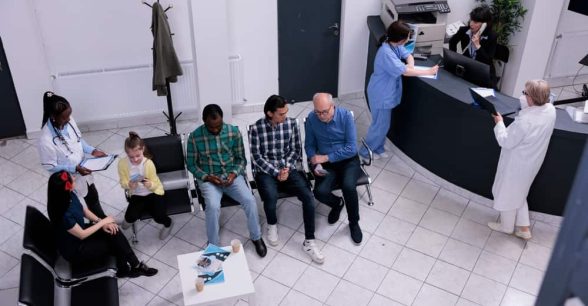This Isn’t A Cane, It’s A Weapon: Ageism, Ableism, and Grace and Frankie
One thing that always frustrated me was when elders would compare my disability to theirs. At first, I brushed off my frustration as reactions to their sometimes ableist and adultist comments. A common assumption I frequently confront is “You’re too young to need that [fill in the blank].” However, I’ve come to realize that my frustration is partially due to my own bias—specifically the prevalence of ageism against our elders.
Being compared to disabled elders bothered me because I didn’t want to be seen as old. My grandmother comparing her medication to mine irked me in the same way a teenager is horrified when compared to their parents; in both cases, one is potentially viewing their future. It was only through distancing myself from the situation that I started to see the true reason for my discomfort.
Several weeks ago, between graduating from college and starting a full-time job, I binge-watched Grace and Frankie on Netflix. It was recommended by multiple people over the years, but I’d never been able to dive into it in the way that I had other sitcoms. There are, of course, some beyond problematic parts: the cast is mostly white and Frankie is constantly engaging in cultural appropriation (stolen mostly from Native cultures). However, there is also a deep and important story of two aging women coming to terms with their own disabilities.
Although the term “disability” is rarely (if ever) acknowledged, ableism—like ageism—is a prominent feature in the show. Grace and Frankie collaborate on inventions, such as a vibrator for older women with arthritis. Later, they create a toilet that helps lift you into a standing position. There’s even a scene where an elder male character returns to his home after a heart attack (and major surgery) to find an “ugly chair” in his living room. He grimaces and argues with his children about the chair’s placement. They insist it is necessary as an assistive device. The chair helps him stand without exerting himself. However, he is a stylish man who prides himself on his presentation to the world. He struggles to see past the ugliness of it.
This echoes much of what I’ve heard from people in the disabled community about accessible devices, clothing, and furniture. Although these devices may serve their functional use, they are ugly, clunky, and cumbersome. They do not allow disabled people to choose their own individual presentation. So much of the disabled experience is having your autonomy, uniqueness, and style taken from you. This is an experience often shared with elders (and those who experience adultism) as well. The ability to participate in fashion or decorate one’s living space—not just for function but for beautification—is deeply significant.
Like disabled people, elders’ desires are often considered trivial, something that gets in the way of their care or medical needs. However, many of these desires are simple enough to fulfill without much trouble and can help validate a person’s autonomy. This show was a true testament to the struggle of coming to terms with disability and aging. It also opened my eyes to the connections between disability and ageism and how my own biases have impacted my view of disabled elders.
I work in a public library. One evening, I listened to a group of older women waiting for a program to start. At first, they were gossiping amongst themselves, something I’d heard my grandmother do hundreds of times with her bridge friends. They whisper-shouted about who had died, who had been moved into a retirement home, and whose grandkids were the envy of them all. After a couple of minutes, one woman piped up. She complained of the people around her (family and strangers) treating her like children are treated. “I’m an adult!” she exclaimed, huffing in frustration.
I’d rarely pondered disabled elders’ struggles with infantilization, a residual manifestation of adultism. I’d seen it play out in my own grandparents’ reactions when they felt my parents were “treating [them like children].” I’d never thought of it as the same experience that I, and many other younger disabled people, endure. However, it is the same core problem. People see me as immature because my height leads them to make assumptions about me and my capabilities; similarly, they make assumptions about my grandparents’ needs and abilities when they see their cane or walker.
Ageism and ableism go hand in hand. While not guaranteed, the longer one lives the more likely one is to develop a disability. A lack of sufficient services for our elders leads to a greater loss of autonomy, which often means placement in nursing homes. While this option may be necessary for some, for others it can feel premature and confining. Grace and Frankie touches on this topic as well, in an episode where a friend with mid-stage dementia is moved to a retirement home. They see that this is the best option for her; she seems well-cared for and they can still visit. However, when they are later moved to the same retirement home (at their children’s insistence), they are horrified at their loss of autonomy; they lose access to many of the activities that drive them.
Lack of available resources and services is a problem for all disabled people—especially those that need high support care. The needs of the disabled community are also the needs of many elders. If we can come together to push for change in available services and access needs, we will be stronger. Ageism is a barrier to disability justice and disability rights. Until we all confront our ageism (among other things), internal and external, ableism will continue to run rampant.
About Rooted In Rights
Rooted in Rights exists to amplify the perspectives of the disability community. Blog posts and storyteller videos that we publish and content we re-share on social media do not necessarily reflect the opinions or values of Rooted in Rights nor indicate an endorsement of a program or service by Rooted in Rights. We respect and aim to reflect the diversity of opinions and experiences of the disability community. Rooted in Rights seeks to highlight discussions, not direct them. Learn more about Rooted In Rights



